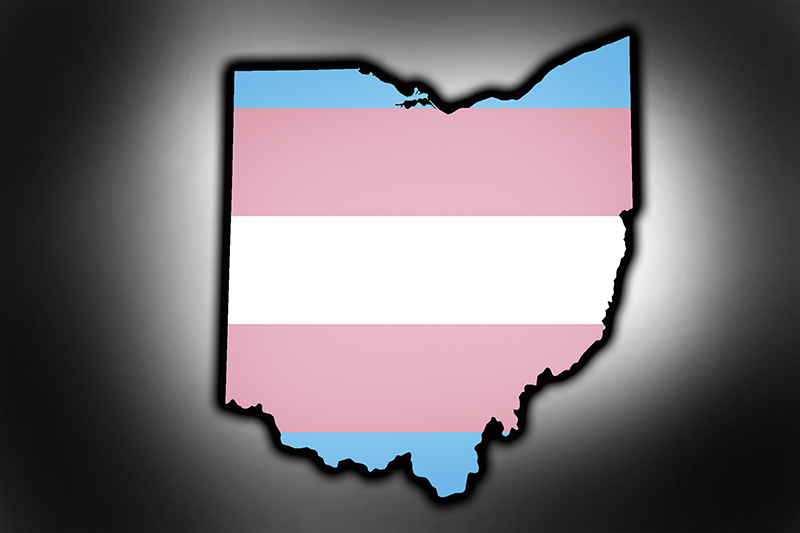Idaho sued over anti-transgender birth certificate and student-athlete bills
LGBTQ advocates say the two laws place burdensome and unconstitutional restrictions on transgender people

The state of Idaho is facing two separate lawsuits stemming from two bills that place burdensome restrictions on the transgender community.
The first bill being challenged targets transgender student-athletes by banning transgender females and intersex individuals from competing on sports teams designated for females — the first law of its kind in the United States.
The lawsuit was filed on behalf of Lindsay Hecox, a transgender freshman and student-athlete who wishes to run cross-country for Boise State University next year, and Jane Doe, a 17-year-old junior at Boise High School who wishes to try out for the girls’ soccer team next year.
Although Doe is not transgender, she is worried about being subjected to invasive “sex verification” testing to prove she is female — which she could potentially be subjected to if another student or a rival team alleges she is transgender and should not be competing, even if that allegation is made in bad faith.
If such a complaint were filed against her, Doe would have to submit to testing and would be sidelined from competing until the results of the testing were released.
Democrats, both in Idaho and in other states where similar legislation is currently being considered — including Alabama, Arizona, Louisiana, and Tennessee — have objected to the idea of banning trans athletes and especially any “sex verification” testing that students would have to subject themselves to if their gender identity is challenged.
Yet Republicans dismissed those concerns and pushed it through to Gov. Brad Little (R), who signed the legislation into law.
“We’re suing because HB 500 illegally targets women and girls who are transgender and intersex and subjects all female athletes to the possibility of invasive genital and genetic screenings,” Gabriel Arkles, a senior staff attorney with the American Civil Liberties Union’s LGBT & HIV Project, which is representing the plaintiffs along with the ACLU of Idaho and Legal Voice, said in a statement.
“In Idaho and around the country, transgender people of all ages have been participating in sports consistent with their gender identity for years,” Arkles noted. “Inclusive teams support all athletes and encourage participation — this should be the standard for all school sports.”
“Governor Little claims he is not a ‘discrimination guy,’ but signing this misguided bill proves otherwise,” Chelsea Gaona-Lincoln, of Legal Voice, said in a statement. “We stand with our transgender siblings and community members impacted by this harmful bill.”
The ACLU has previously noted that Idaho already had one of the more restrictive policies regulating transgender participation, requiring individuals who are transgender to complete one full year of hormone therapy before being eligible to participate in sports based on their gender identity.
“I just want to run with other girls on the team,” Hecox said in a statement. “I run for myself, but part of what I enjoy about the sport is building the relationships with a team. I’m a girl, and the right team for me is the girls’ team.”

The other lawsuit that has been lodged against the state is a challenge to another bill signed by Little that prohibits any individual from changing the gender marker on their birth certificate more than a year after their birth, and for any reason other than a clerical or coding error.
Last week, Lambda Legal filed a motion with the U.S. District Court asking it to find that the bill violates a 2018 federal court ruling that found that the state’s policy prohibiting all gender marker changes on birth certificates was unconstitutional.
“Two years ago, the court determined that the state’s ban against transgender people correcting their birth certificates was dangerous, discriminatory, and indefensible. That is why the court permanently barred Idaho from automatically turning away transgender people seeking birth certificates that match their gender identity. Permanent means permanent,” Lambda Legal Counsel Peter Renn said in a statement.
“It is shocking that state lawmakers would be so brazenly lawless as to defy a federal court ruling,” Renn added. “The rule of law collapses if we refuse to abide by the outcome of who wins and who loses in our system of justice. HB 509, which reinstates a ban that the court already declared unconstitutional, is a naked flouting of the rule of law.”
Opponents of transgender rights say that the state has an interest in requiring people’s identity documents to correctly record the sex they were assigned at birth, both for security purposes and to prevent potential fraud.
But supporters say that barring transgender people from obtaining identity documents reflecting their gender identity discriminates against them and violates their right to freedom from compelled speech.
Other LGBTQ advocates note that transgender people whose identity documents don’t match their gender presentation are more likely to be harassed, denied benefits or services, discriminated against, or assaulted.
For instance, one of the original plaintiffs in the 2018 case was subjected to verbal discrimination from fellow customers and employees at the local Social Security office after she presented her birth certificate, which included her “dead name” and her assigned sex at birth.
“Essential identity documents should accurately reflect who you are,” Kara Ingelhart, a staff attorney for Lambda Legal, said in a statement. “The court recognized that two years ago, and we ask only that it confirm what it already said.”
Read more:
Sheriff’s deputies’ union leader accused of politicizing gay colleague’s death from COVID-19
“Big Three” automakers back campaign to add LGBTQ protections to Michigan’s civil rights law
Support Metro Weekly’s Journalism
These are challenging times for news organizations. And yet it’s crucial we stay active and provide vital resources and information to both our local readers and the world. So won’t you please take a moment and consider supporting Metro Weekly with a membership? For as little as $5 a month, you can help ensure Metro Weekly magazine and MetroWeekly.com remain free, viable resources as we provide the best, most diverse, culturally-resonant LGBTQ coverage in both the D.C. region and around the world. Memberships come with exclusive perks and discounts, your own personal digital delivery of each week’s magazine (and an archive), access to our Member's Lounge when it launches this fall, and exclusive members-only items like Metro Weekly Membership Mugs and Tote Bags! Check out all our membership levels here and please join us today!


























You must be logged in to post a comment.